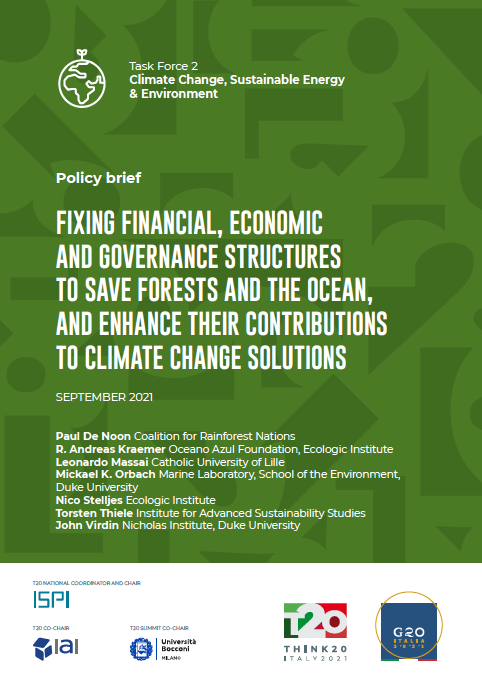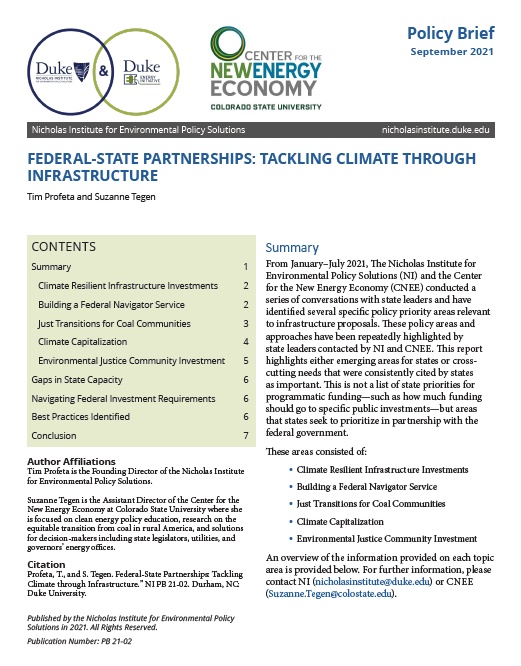Publications
Corporations and Plastic Pollution: Trends in Reporting
We compiled a novel library of 2,317 corporate reports from the world's 200 largest companies, by revenue, over a ten-year period (2010–2019) and used text mining tools to identify pronounced regional and sectoral variability in the extent to which plastic waste and pollution is of material importance to corporate operations. The results show a dominant focus on recycling, with far less attention to the other stages of the life cycle of plastic.
Fixing Financial, Economic and Governance Structures to Save Forests and the Ocean, and Enhance Their Contributions to Climate Change Solutions
Forests and the ocean are vital for climate, biological diversity, and human communities, but they are degraded and their ecosystem services are seriously impaired, mainly because financial, economic and governance structures are misconfigured. We propose that G20 help strengthen the REDD+ climate instrument for forests and extend it to Blue Carbon1 from coastal and marine ecosystems. Scaled up to cover the Earth’s two largest, most diverse and most productive ecosystems, these two approaches can deliver significant economic and climate benefits.
Federal-State Partnerships: Tackling Climate through Infrastructure
This report by the Nicholas Institute and the Center for the New Energy Economy highlights several specific policy priority areas relevant to infrastructure proposals in regards to climate issues.
Climate Policy Impacts on Building Energy Use, Emissions, and Health: New York City Local Law 97
This study in Energy uses several models and regulatory datasets to build novel NYC building energy use and GHG emission profiles based on New York City’s local law 97 and to investigate the impacts of LL97 on energy, climate, and health. The findings demonstrate the necessity of including health in energy and climate policy design.
Global Climate Change and Human Health: From Science to Practice, 2nd Edition
This chapter from Global Climate Change and Human Health: From Science to Practice discusses how various ecosystem services affect human health and describes how climate change might disrupt or alter the delivery of those services.
Collaborative Pathways between Philanthropy and Development Aid in the Sprint to 2030
This essay provides ocean philanthropists with a brief introduction to trends in ocean-targeted official development assistance (ODA), to demystify the latter for the former, and suggest some ways that the two might more closely work together and enhance their individual efforts.
Connecting Ecosystem Services Science and Policy in the Field
The authors outline the framework used to teach environmental policy instruments through the “Five P’s”: prescription, property, penalty, payment, and persuasion and then discuss the discrete ecosystem services research required to effectively implement each tool.
Integrating Programmatic Expertise from across the US and Canada to Model and Guide Leadership Training for Graduate Students in Sustainability
In this paper, the authors describe the integrative approach they took to synthesize their collective knowledge of Leadership Training for graduate students in Sustainability (LTS) with their diverse programmatic experiences and, ultimately, translate that work into concrete guidance for LTS implementation and design.
LNG Supply Chains: A Supplier-Specific Life-Cycle Assessment for Improved Emission Accounting
Global trade in liquefied natural gas (LNG) is growing significantly, as is interest in the life-cycle greenhouse gas (GHG) emissions associated with LNG. Most assessments of life-cycle GHG emissions from LNG have employed national or regional average emission estimates; however, there is significant variability in emissions across different suppliers and across the natural gas supply chain. This work describes a framework for compiling supplier-specific GHG emission data for LNG, from the producing well to regasification at the destination port.
GEMS Phase II Report: Coastal Restoration
This Phase II report of the GEMS project identifies metrics available to monitor the social and economic outcomes of a wide variety of coastal projects funded in the Gulf, using ESLMs to illustrate how these projects’ impacts cascade through the biophysical system to result in social and economic outcomes. Phase II expands the focus to assess socioeconomic metrics for 16 coastal project types, including habitat restoration, recreational enhancement, and water quality improvement projects.










